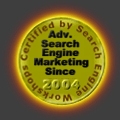 Look how old this is!
Look how old this is! I post at SearchCommander.com now, and this post was published 17 years 7 months 18 days ago. This industry changes FAST, so blindly following the advice here *may not* be a good idea! If you're at all unsure, feel free to hit me up on Twitter and ask.
One reason I like driving long distances (okay, the only reason) is because I get to catch up on old broadcasts from Webmaster Radio that I’ve stuck on my iPod. I’ve tried to listen before while working, and it’s just not productive. I can’t concentrate on the show and get any work done at the same time.
The other day I was listening to Jeremy (ShoeMoney) Schoemaker’s June 5th show, Net Income where he had Rand Fishkin as a guest.
The subject of the entire show, was a debate between them, as to whether or not a blogger should always disclose that he or she is benefiting financially from a recommendation originating from their website.
The reason this become important enough for a show is because Rand wrote a blog post around Memorial Day that wasn’t exactly slamming Jeremy, but wasn’t exactly flattering either. He called the post – The Vast Ocean Between Shoemoney & SEOmoz and Why You Should Be Able To Trust Blog Links
This came about because Jeremy wrote a post called Full Disclosure – Assume the Position
Both posts are interesting, but I don’t really feel that they were that all that far off in their respective positions.
Jeremy’s point was that being a savvy media consumer, you should always assume that there is something coming back to the author on the backend. This should apply whether it’s something as innocent as a backlink in a story or something as obvious as a banner on the side of the page.
Rand’s point was that a blog could quickly lose credibility if it was discovered later that a particular review or recommendation was the result of an affiliate agreement or even a direct payment.
The interesting thing was that I really did agree with both of them. I agree completely with Jeremy, that one should always be suspect whenever reading anything on any blog, and it’s one of the first things I look for when following a link.
You should always do the investigation for yourself before accepting something you read online as a fact. I would even take that a step further and apply it to my general news intake as well, from TV and print media. Why would anyone trust one source for everything they say?
On the other hand, I also agree with Rand’s very well made point about discovery after the fact. In the radio show, he used an example of “what if Danny Sullivan wrote a column about Yahoo…” and later it was discovered that they had sent him a big fat check with a request to write another post about the same subject. Wouldn’t that cause him to lose credibility in the eyes of his readers?
Whenever I’ve written about a product I like on my own blog, and provided a link to it, I make it a point to identify it as an affiliate link, if it actually is one. Lately though, I’ve wondered if that additional work is just a pain in the neck, and thought that it shouldn’t just be obvious to anyone reading that there may be an affiliation there.
After listening to this show, I’ve decided to continue my practice of always identifying any affiliate link that I recommend for the sake of full disclosure.
As much as I agree with Jeremy’s points, the fact is that most people are not very savvy consumers of information. I agree with Rand that going the extra step to identify an affiliate link is not that much work, and it’s definitely a way of keeping my readers trust intact, so I’m going to continue as I’ve always done.
I would encourage everyone who is monetizing their blog to give a listen to this show, and then do what they think is right for them.
I would also encourage everyone who is reading blogs to assume that there may be something going to the author on the backend of every recommendation they give. That doesn’t make it incorrect or invalid information, but in today’s affiliate economy, it is something that you could assume, and in many cases you would be correct.
Here is a (non affiliate) link to Webmaster radio. Look for the June 5 2007 show, to give a listen for yourself…




















Scott,
This is one of your finest blog posts. This is a Rolling Stone quality post. Keep it up.
I just listened to the Radio recording. Wow. Both have great points but my fulcrum tipped to Rand on this one. “Hey ,if you are getting paid to write something in a positive way, let me know” was the only common remark between the two interviewees.
Thanks for that, Scott. That was a nice link. I am going to link to this Blog post from my ReviewMe post.